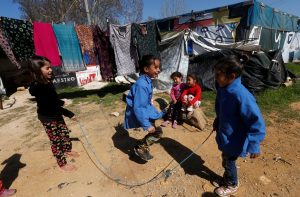
By Brian Ellsworth and Vivian Sequera
CAUCAGUA, Venezuela (Reuters) – Venezuela’s school year began on Monday with few students arriving in classrooms amid a crippling economic crisis that has left many families unable to afford supplies or provide their children with enough food to focus on schoolwork.
The OPEC nation is collapsing under low oil prices and an unraveling socialist economic system, leaving millions struggling to eat and hundreds of thousands streaming into neighboring countries in search of better conditions.
Though classes often take several weeks to get into full swing, teachers said the absenteeism was significantly more notable this year.
In the poor, rural town of Caucagua about 75 kilometers (47 miles) from Caracas, only three students had arrived at the Miguel Acevedo Educational Unit, a public elementary school that has 65 students registered, according to principal Nereida Veliz.
School performance “is quite low because children are not coming to class” said Veliz in the small schoolhouse where the power is out and running water only works three days a week. Students generally come to receive state-sponsored meals.
“They do not eat at home, they eat here,” she said.
The Education Ministry did not respond to a request for comment.
Education Minister Aristobulo Isturiz on Friday said classes would start this week for 7.6 million students at 30,000 schools around the country, a figure that includes 5,000 private schools.
Venezuela’s hyperinflationary collapse has left pencils, books, and uniforms out of the reach of the average citizen.
A steady decay of public transportation has become a growing limitation on activities ranging from delivering products to taking children to school.
“I made a huge effort to bring my son to school. Part of his uniform is from last year and from his brother’s things,” said Omaira Bracho, 50, in the coastal city of Punto Fijo in the state of Falcon. “I found shoes on sale. The hardest thing is the school supplies.”
President Nicolas Maduro says the country is victim of an “economic war” led by U.S-backed political adversaries.
In the border state of Tachira, Javier Tarazona of the state teachers’ association said classes had not started due to problems including lack of power, inadequate sanitation, and insufficient food.
At the Benedicto Marmol school in Punto Fijo, only three of 365 students showed up on Monday, according to Falcon state teachers’ union representative Mari Garcia.
“There are always a lot of children missing at the beginning of the class, but it has never been so noticeable,” she said.
(Additional reporting by Mircely Guanipa in Punto Fijo and Anggy Polanco in San Cristobal; Editing by Alexandra Ulmer and Andrea Ricci)

